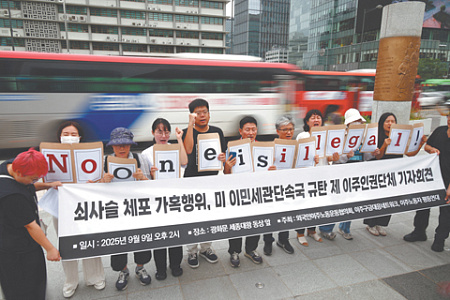
South Korea’s Foreign Minister, Cho Hyun-dong, has arrived in Washington seeking urgent clarification from U.S. officials following a major immigration raid that has severely strained relations between the two allies. The incident, which saw hundreds of South Korean workers detained at a Hyundai factory in Georgia, has intensified existing tensions that have been mounting since the start of the Trump administration, prompting calls in Seoul for a complete reassessment of its cooperation with the United States.
South Korean President Lee Jae-myung condemned the raid by U.S. Immigration and Customs Enforcement (ICE) as an “unjust encroachment” on the rights of his country’s people and businesses. On his orders, Minister Cho is scheduled to meet with U.S. Secretary of State Marco Rubio to clarify the fate of the detained workers and de-escalate the burgeoning diplomatic crisis.
The controversy erupted on September 4th at a massive new electric vehicle battery plant under construction by Hyundai Motor Group and LG Energy Solution near Savannah, Georgia. ICE agents detained 475 individuals, approximately 300 of whom were confirmed to be South Korean citizens. U.S. authorities claim most were in the country on short-term business or visa-waiver programs that do not permit employment. The situation was inflamed by televised images in South Korea showing their compatriots in shackles being led away by ICE officers.
While President Lee has pledged to his nation that such incidents will not be tolerated, the White House has shown little sign of apology. President Donald Trump initially defended the operation, stating that ICE was “just doing its job” and that the detained workers were “illegals” who had broken the law. He later softened his stance, suggesting he would consider changes to visa rules for foreign workers, but insisted that the raid had not harmed the bilateral relationship.
Public sentiment in South Korea, a traditionally loyal U.S. ally, has turned sharply critical. A poll conducted by Realmeter found that nearly 60% of South Koreans viewed the ICE raid as “excessive,” while protestors gathered outside the U.S. embassy in Seoul with signs reading “No one is illegal!” The raid is viewed by many not as a routine enforcement action, but as a profound national insult.
The incident is further complicated by its economic context. The White House had recently pressured Seoul into committing approximately $350 billion in U.S. investments to avoid crippling tariffs on South Korean exports. The raided factory itself was a cornerstone of this agreement, projected to create up to 8,500 American jobs. In the wake of the raid, critics in South Korea are now demanding that President Lee halt these investments, arguing that the raid was a calculated act of intimidation designed to force even greater concessions from Seoul.
However, some analysts believe this interpretation is mistaken. Evgeny Kim, a leading research fellow at the Center for Korean Studies, argues the raid was not specifically targeted at South Koreans, as the Trump administration had already secured the investment deals it sought. Instead, he suggests the incident is part of a broader, nationwide immigration crackdown. The event has, however, starkly exposed a long-standing problem with the U.S. work visa system, which is notoriously slow and complex, often compelling foreign workers and companies to utilize less suitable visa categories. The crisis is now expected to force difficult negotiations over revising these long-standing visa agreements.
